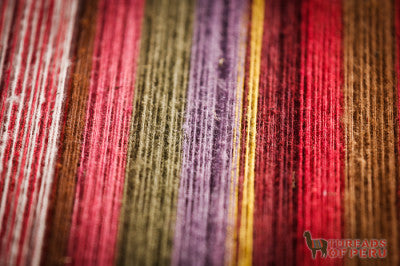The pedido (literally request or order) is one of the most important steps in getting Threads of Peru goods to market. In fact, it is one of the three pillars of our community outreach program; the other two being the dye workshops and the entregas (deliveries).
The pedido falls right in the middle of the process; after the women have dyed their wool and before we return to the villages to pick up the final product.

Pedidos are crucial to building sustainability in our organization. It is the time when the Threads staff can dialogue with the weavers about what is selling and how they can improve their work to appeal to our customers. Getting closer to what the market wants means more work for the women and more development in their communities.
Of course, we always strive to maintain the integrity of the Andean weaving tradition in this process, sometimes to even a higher standard than the women themselves would keep. For instance, many of our weavers prefer the deeply saturated colors of synthetic dyes, while our customers prefer the more rustic hues of natural dyes.

Pedidos also offer us a chance to build the community that is so important to working in the Andes. While there is certainly lots of weaving going on, there is also a lot of time for chatting and eating together. Building trust helps with communication and lets the weavers know we are there for the long term.

The first step to a successful request day begins long before the actual day itself. Two of our co-founders, Adam Collins and Angie Hodder, keep track of what is selling and what trends are emerging in our corner of the fashion world. Once they are satisfied with their collection, they send the data to Peru, where it is interpreted into Spanish, and into a format that is easier to convey to the women in the communities. The final collection is a collaboration between the Western culture, an understanding of what is possible from the women, and then melded into the final product by the Quechua interpretation of our request.

Our master weaver Daniel Sonqo joining the weaving process.
The day of the pedido begins with the woman setting up their looms and our master weaver, Daniel Sonqo, helping the women translate the designs from paper to reality. Daniel possesses an amazing talent for looking at a design, reading a few details about the measurements, and then knowing how to bring it into the real world. His experience has taught him how to know the exact thread count each band of color in a weaving requires.

Once Daniel is satisfied that the women are off to a good start, the real weaving begins. Two women sit across from each other. Each drives two posts into the ground and secures a cross bar between them. Then balls of yarn are tossed back and forth between the women — creating the initial structure of the weaving. During their work, Daniel keeps checking in to make sure the thread counts are correct and offers helpful advice.

When the loom is full, the job falls on one or the other of the women. She straps the weaving around her waist and begins the process of cross-weaving. Much like a traditional loom, a large needle is used to pull thread between the fibers that were strung across the loom earlier. This is the point where designs and intricate patterns take shape.

At the end of the day, the women roll up their weavings and take them home where they will be finished. Many times, Threads’ staff holds a final meeting with the women to talk about what they learned and any concerns either party might have.
Goodbyes involve lots of handshakes and exchanges of thanks before Threads’ staff drives (or walks) away and the women carry their crafts home. The next time we see the women will be at the entrega, when their balls of yarn and rolled up weavings will have become the products we ship all over the world!

